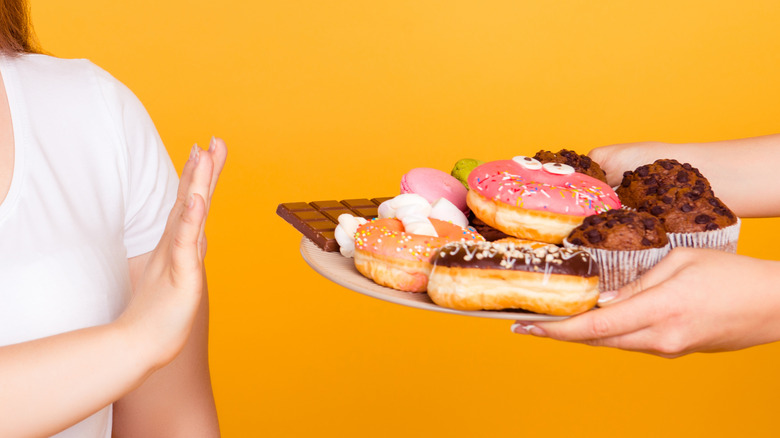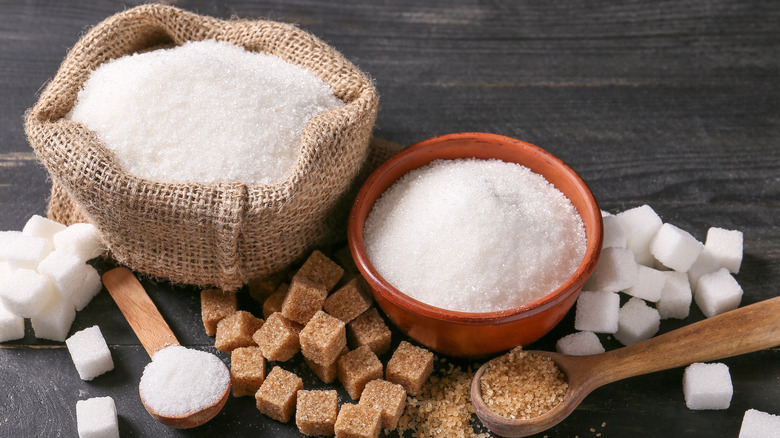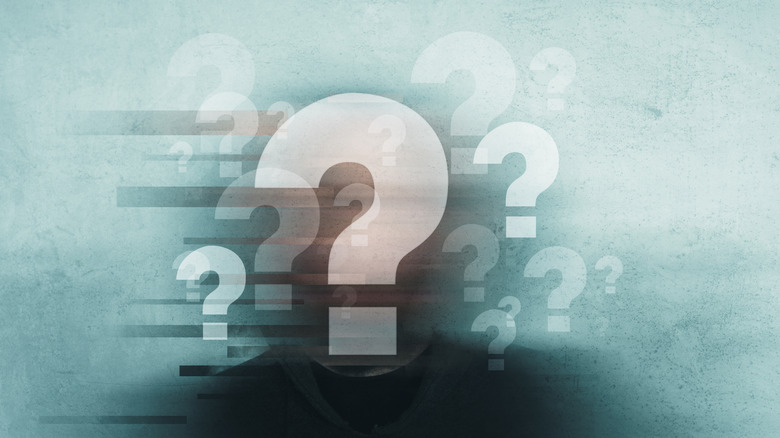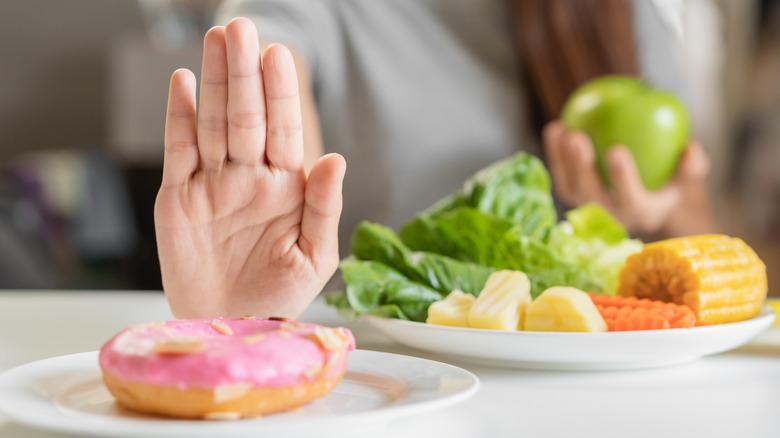You Don't Eat Enough Sugar If This Happens To Your Body
In a lot of circles, eliminating sugar from your diet tends to be regarded as the pinnacle of healthy choices. Plus, the strong demonstration of self-control this dietary effort requires can even inspire admiration. However, the side of the coin that is less discussed is that some people who avoid sugar simply don't get enough to support their overall health and balance their blood sugar levels. Even in populations without diabetes, blood sugar levels and insulin are significant components of the human physiology that should not be neglected in the name of health.
All of our cells need glucose (or sugar) to carry our their functions (per Healthline). If you deprive your body of this necessity, a whole host of unpredictable and frightening symptoms can follow (per Verywell Health). Even if you are not intentionally cutting out sugar, some of these symptoms can become reality by simply waiting too long between meals. Generally speaking, low blood sugar is classified as less than 70mg per dL of blood.
If you are experiencing any of the warning signs of low blood sugar, check in with your doctor and ask for a blood glucose test to confirm whether or not your blood sugar levels are low.
What is glucose?
While popular health rhetoric might lead you to believe that sugar is the enemy, our bodies actually need it to function. Simply put, carbohydrates are one of the three macronutrients. The other two are fat and protein, as explained by Healthline. When it comes to carbs (which have also been villainized in diet culture), think breads, fruits, rice, etc. Carbohydrates are basically sugar molecules that vary in complexity. When we consume carbohydrates, our bodies break them down and turn it into glucose.
Glucose is a simple form of sugar that provides fuel for the function of our cells (via Healthline). Without enough carbohydrates to turn into glucose, our bodies resort to Plan B when it comes to energy production, which ultimately places undue stress on our bodies (per Healthline). Our cells work hard every day to carry out a ton of bodily functions — and glucose is what provides them with the energy they need to do so.
In a normally functioning body, when we consume sugar, our pancreas secretes a hormone called insulin to help regulate our blood sugar levels. In some cases, the pancreas is unable to produce insulin correctly, which can lead to high blood sugar and other complications, most notably diabetes.
Low energy
Neglecting to consume enough sugar has a huge impact on energy levels. This totally makes sense, since every single cell in our bodies uses sugar as fuel to initiate the elements of life. Lowered energy levels may stem from a massive lack of sugar, like if you are actively engaging in the ketogenic diet. This can also come about as a result of skipping meals or waiting too long between them, which essentially deprives your cells of fuel in much the same way.
When you are not consuming enough carbohydrates, your body lacks accessible glucose to use as fuel. Hungry cells, including your brain cells, mean that they are unable to function as they normally would. This can result in fatigue as your cells struggle to function (per Self).
You can think of eating carbohydrates like putting gas in your car. When you eat a bagel in the morning, that is like filling up your gas tank. But as you move through your day, the gas slowly gets used as it propels your body forward. If you don't replenish your tank, you end up sputtering to a stop as your gas gauge reads "empty."
Headaches
Headaches can often be an indication that our blood sugar levels are out of whack. In fact, according to Healthline, blood glucose fluctuations affect your brain more dramatically than any of your other organs. It can also have a huge impact on your nervous system, which can contribute to headaches as well.
Verywell Health reports that many people who experience blood sugar-related headaches experience them as dull, throbbing, temple-focused headaches that often occur congruently with other symptoms of low blood sugar. Low blood sugar, or hypoglycemia, can also trigger migraine headaches. That said, blood sugar-related migraines generally seem to exist without some of the classic migraine symptoms, such as nausea, vomiting, and light and sound sensitivities.
To avoid headaches caused by low blood sugar, experts recommend preventing low blood sugar moments (big surprise). This can be accomplished by eating small, frequent meals and not going more than three hours between each meal. Diets that include plentiful protein and fiber are also helpful in preventing headaches of this variety.
Mood swings and an increase in stress hormones
Even if you are not prone to getting hangry, you likely know someone who can be downright insufferable when they are in a food mood.
As it turns out, mood swings can often be a sign of low blood sugar, because of the effect the lack of sugar has on our hormones. When our blood sugar starts to drop below its comfortable level, our bodies compensate by producing adrenaline, also known as epinephrine, a stress hormone. This thrusts our bodies into our fight-or-flight mode, which can lead to our feelings of crankiness and anxiety.
If you do not respond to these initial symptoms, your body remains in this state and responds by pumping out another hormone, cortisol. Cortisol is a stress hormone that helps us regulate our feelings of fear and our moods. When adrenaline and cortisol are allowed to co-mingle within our bodies, especially long-term, the result can be anxiety that results in mood swings, according to WebMD. Over time, this increase in stress hormones and sustained anxiety can have a detrimental effect on our immune systems, as well as our capacity to heal and deflect disease (via PubMed).
Sleep issues
Since fatigue is a major indicator of too-low blood sugar, it feels logical to think that finding and maintaining sleep would be easy if you are not eating enough sugar. But interestingly enough, the opposite is the case.
Johns Hopkins Medicine sheds more light on nocturnal hypoglycemia, or low blood sugar at nighttime. The people who are most at risk of nocturnal hypoglycemia are those who skip dinner frequently, exercise or drink alcohol before bedtime, or have infections. They report that many of the more severe incidences of low blood sugar occur at nighttime, making it all the more important to fuel your body effectively throughout the day.
Some of the symptoms that occur at night can affect sleep patterns. This includes symptoms such as restlessness, irritable sleep, and nightmares. Some of the other symptoms can simply degrade the quality of a person's sleep. These symptoms are more along the lines of clammy, hot skin, trembling, rapid heart rate, and breathing changes — all of which can truly affect your ability to get good quality zzz's.
Brain fog
The term "brain fog" is a type of catch-all that loosely explains decreased cognitive functioning. Brain fog can present as issues with concentration and/or memory (per Verywell Mind). When considering brain fog and its ties to blood sugar, diabetes often comes up as a link (via Healthline). In some cases, unregulated blood sugar and insulin imbalances can lead to brain fog and other related issues. But on the flip side, allowing your blood sugar to dip too low can also cause issues with cognition.
As mentioned, our cells cannot function properly when they are deprived of sugar, which they use for fuel. Of course, such is the case for brain cells as well. Our billions of little brain cells take in the sugar we eat and convert it to energy, which is what allows for cognition. Without that fuel, this natural process struggles to carry on in the same way. Without properly fueled brain cells, we fail to concentrate and remember things to the best of our abilities (via Healthline).
Blurred vision and dizziness
In movies, it seems like those who don't eat enough often become dizzy, sometimes pass out, and tend to experience vision issues. As it turns out, those are not just Hollywood-created symptoms — they're real side effects of your blood sugar being too low.
When your body detects that your blood sugar is low, your brain cells start holding on to whatever fuel they have in their itty-bitty reserve tanks, which can affect their functional prowess and impede neurological functioning. Often, this results in blurred vision, dimmed vision, and dizziness. Everyday Health cites a study explaining that a whopping 73% of those monitored experienced blurred vision as a result of low blood sugar. Beyond that, around 45% of this study's participants experienced a dimming of their vision, while 37% experienced black spots in their fields of vision.
When dizziness is part of the equation, it is best to lie down to avoid further complications. It is recommended that you consume 15 to 20 grams of carbs that the body can easily convert to sugar — like fruit juice or honey — to help quell these unpleasant low blood symptoms (per the Mayo Clinic).
Reliance on stored fuel
Another (admittedly fun) way to experience low blood sugar is by drinking too much alcohol. Your liver works overtime to undo the damage done whenever you imbibe bottomless mimosas every Sunday. It also plays a crucial role in the creation and storage of blood glucose. This is a backup plan for blood sugar regulation; it is not the intended way for your blood to increase its glucose levels. (When your liver is too busy dealing with alcohol's toxic side effects, it is less capable of releasing its stored glucose if your body needs it.)
When you don't consume enough carbs to fuel your body, this fuel cache comes in handy, as it can revive your starving cells. When your blood sugar is low and you do not eat something to replenish it, hormones are released that prompt the liver to compensate for this. This is great on occasion, but when utilized too frequently, it can leave even your reserve tank on empty (via Healthline).
Circling back to the car and gas tank analogy, it is semi-acceptable to run your car until it is on fumes once or twice as you learn the limits, but only if you have a tank full of gas nearby to refill if your car sputters to a stop. The same applies to our bodies. It's okay to discover your limits once or twice, but constantly running on E without any gas in your backup tank is a recipe for disaster.
Quickened heart rate
As we now know, neglecting to provide our hard-working cells with the glucose they so desperately need can leave us with a host of symptoms that inhibit our abilities to live our best lives. Our blood sugar levels can affect the rhythms of our heartbeats, which isn't exactly a part of our bodies that we should mess with (on account of the heart being arguably the most important organ we have).
Even acute episodes of low blood sugar can cause your heart rate to quicken, and can potentially lead to heart palpitations. This is especially dangerous in people who have diabetes that is not well-controlled (via Healthline). To add, consuming alcohol in excess, caffeine, or exercising beyond the recommended amount can all affect your body's ability to regulate blood sugar. These activities and indulgences can wreak havoc on your blood sugar, glucose reserves, and insulin production as well (per Medical News Today).
Hunger -- or losing interest in eating
Hunger might seem like the most common side effect of not consuming enough sugar, but the way in which low blood sugar-induced hunger presents itself is a bit more nuanced that you might expect.
Initially, hunger is likely to be the way your body tells your brain that it is time to eat (per Healthline). Often, hunger cues indicate that your blood sugar levels are dropping. If you listen to these signals from your body and consume a balanced snack or meal in response, your blood sugar should even out and keep you moving until it is time for your next meal.
Conversely, if you ignore your hunger cues, things start to get wacky. If you exist in a state of low blood sugar for too long, your body is likely to experience hunger, but also an aversion to food or drinks. Wait, what?! We know, that hardly makes sense, but it's true. If you experience this, it is best to munch on a small snack of easy-to-digest carbs to give your body the kick in the pants it needs to keep trucking along. That said, the rollercoaster of blood glucose regulations and hormones can lead to feelings of nausea, which may dissuade you from eating (via Diabetes).
Jitters
Have you ever skipped a few meals out of sheer life chaos, stopped to take a breath, and then realized that you're as jittery as if you'd chugged three Bang energy drinks? Well, you are not alone. (But don't ever drink three Bang energy drinks in succession, please. Anyway, we digress.)
Allowing your blood sugar to drop below its healthy range can lead to feelings of jitters and edginess, not unlike the influence that excessive caffeine can have on your system. This is the opposite side of the same coin as anxiety and irritability, caused by the release of stress hormones like epinephrine due to low blood sugar (via Healthline). As the low blood sugar jitters mount, you might start to feel tingling or numbness in your mouth, which is another surefire sign that you need some carbs, stat.
And if this happens too often, your body would cease to release stress hormones (hypoglycemia-associated autonomic failure or HAAF, which is another serious issue).
Cool, clammy skin
Another surprising but common side effect of low blood sugar is the chills. Sometimes, the chills can feel like those you get when you have the flu, in that you literally cannot get warm. With the chills can come a pale countenance and, unfortunately, clammy skin. Even if you do not experience the chills or a warm skin sensation, your skin might become unusually clammy (via Healthline).
Clamminess is generally how our bodies respond to being too warm — we perspire slightly to cool our surface temperature. In the case of clammy skin and how it relates to blood sugar, though, it has nothing to do with our core body temperatures. In fact, when our cells don't have the fuel they need, things start going haywire.
If you experience cool, clammy, and pale skin after skipping meals, eat a carbohydrate-containing food to find your way back to homeostasis. However, if you are experiencing clammy skin and do not suspect it to be blood sugar-related, it is best to contact your doctor as it could be a sign of a much more serious condition (via Healthline).
Weakness
As we have established, not consuming enough carbohydrates can affect your cells' ability to function (as they derive fuel from glucose, which is a simplified sugar). Since our cells need glucose to carry out their daily functions, it makes sense that they might straight-up fail to perform if they do not have the right fuel. While our brain cells often suffer the brunt of this and we feel it as brain fog, dizziness, blurred vision, and more, it can affect the strength of all of our other cells as well — including our muscle cells (via Healthline).
Aside from dizziness and general fatigue making themselves known as a result of low blood sugar, our muscles might fail to contract and function to the full extent of their abilities. This can leave us feel weak and lethargic, which is ultimately a reflection of how our cells feel as they struggle to go about their day-to-day business without enough fuel. To combat this weakness, focus on consuming small amounts of accessible carbs, especially as you exercise and deplete your glucose/glycogen stores (per Mayo Clinic).













